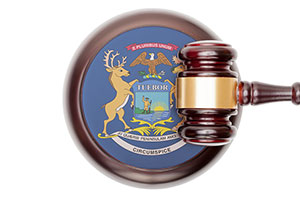A Michigan Court of Appeals panel has ruled that licensed professionals who serve as expert witnesses owe the same duty to their party as they would to any client and that witness immunity is not a defense against professional malpractice.
Foreclosure Case
Diana and Spiro Voutsaras defaulted on a commercial mortgage that was held by Gallagher Investments. They hired Murphy & Spagnuolo PC to represent them in foreclosure proceedings. The law firm advised the Voutrsarases to file a counterclaim against Gallagher and a third-party claim against some of Gallagher’s principal actors for malpractice.
The firm hired Kenneth Mogill as a legal ethics expert and Slucter and Gannon Group as experts in real estate brokerage. The law firm then informed the Voutsarases that their litigation strategy was bound to fail. The district court granted summary judgment against the Voutsarases.
Malpractice Case
Following Diana Voutsaras’ death in January 2015, her estate filed a suit against Murphy & Spagnuolo and the retained experts. The estate claimed that the law firm had failed to advise it of a favorable settlement offer and that it had deliberately concealed the fact that the estate’s claims were frivolous in order to increase pretrial costs. The estate also claimed that the expert witnesses had breached their duties to the estate by failing to properly investigate the facts required to formulate their opinions, failing to understand the applicable standards, and failing to provide a competent professional opinion.
The law firm settled with the estate and the expert witnesses filed a motion for summary judgment arguing that they were protected by witness immunity. The district court granted summary judgment to the expert witnesses, using a broad interpretation of the witness immunity standards. The estate appealed.
Court of Appeals
On appeal, the estate argued that the expert witnesses owed to it a legal duty and that they breached that duty. The expert witnesses claimed that the trial court was correct in its determination that all witnesses enjoy total immunity for any relevant testimony provided during judicial proceedings. The trial court and the expert witnesses relied on the 1999 Michigan Supreme Court case, Maiden v. Rozwood.
The Michigan Court of Appeals panel ruled that Maiden was only partially applicable to this case. The court agreed that the witness immunity doctrine protects any witness based on the substance of their testimony or evidence. However, the panel ruled that witness immunity did not necessarily protect a witness from giving professionally incompetent testimony.
It wrote,
To the extent plaintiff’s claims rest on the Mogill defendants having provided damaging testimony or evidence intended for consideration by the trial court, the Mogill defendants are clearly protected by the doctrine of witness immunity. However, we find nothing in Maiden, or any other Michigan case law, suggesting that any other claim of professional malpractice by a client is precluded merely because the professional was expected to provide expert testimony.
The panel concluded, “We hold only that the Mogill defendants are not absolutely immunized from professional malpractice claims where they already owed a duty of professional care, merely because part of their retention included the provision of expert testimony.”




